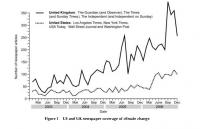A new paper by Oxford Research Fellow Max Boykoff shows that phony media balance has almost disappeared in U.S. climate change coverage.
But Boykoff’s paper also shows an embarrassing difference in the extent and quality of climate change coverage in the United States, compared to coverage in the United Kingdom. For example, he found that between 2003 and 2006, UK papers covered the story three times as often as U.S. papers and were significantly more likely to present it accurately.
Boykoff, a James Martin Research Fellow at the Oxford University Centre for the Environment, released a landmark paper three years ago with his brother Jules, demonstrating that the “prestige press” in North America was misrepresenting climate science by usually reporting one voice attesting to that science and one voice denying it. While the scientific literature between 1993 and 2003 was unanimous in accepting that human activities were making climate change worse, Boykoff and Boykoff found that newspaper stories between 1988 and 2000 reported in more than half the cases that there was still a scientific dispute.
Max Boykoff has now updated that study and extended it to the U.K.
He surveyed news coverage in four U.S. prestige newspapers (The New York Times, The Wall Street Journal, the Washington Post and the Los Angeles Times) and three prestige papers in the UK (The Times, The Independent and The Guardian).
Boykoff’s first discovery is that UK papers have been giving the climate change story almost three times as much attention. During the three-year survey period, the three UK papers carried 6,922 stories on climate change, compared to 2543 articles in US newspapers. He also found that in 2003 – at a time when U.S. papers were giving the story “he said/she said” treatment more than 35 per cent of the time – U.K papers were quoting contrarians in only 1.67 per cent of their stories. In the time since, however, contrarian coverage in both countries has dwindled to a level below statistical significance.
In his conclusion, Boykoff speculated on several reasons for the difference in coverage. One was the political split in the U.S.
Also, a 2007 National Journal poll revealed that 95 per cent of Democrats and just 13 per cent of Republicans answered ‘yes’ to the question ‘do you think that it’s been proven beyond a reasonable doubt that the Earth is warming because of man-made problems?’ (There is an obvious chicken-and-egg problem here: was American media coverage biased by politicians or were Republicans intransigent because they were being misinformed by their newspapers?)
Boykoff also reported on the political manipulation of climate change research by the Bush administration and, especially, the intervention by think tanks and front groups funded by energy interests, particularly Exxon Mobil.
Regardless of the causes, however, Boykoff’s research proves what we have suspected: the U.S. media blew this story – seriously letting down the people who rely on American journalists to show leadership – and give accurate information – on issues important to the whole world.
Like what you read on DeSmogBlog? Subscribe to our RSS feed here.
Subscribe to our newsletter
Stay up to date with DeSmog news and alerts






